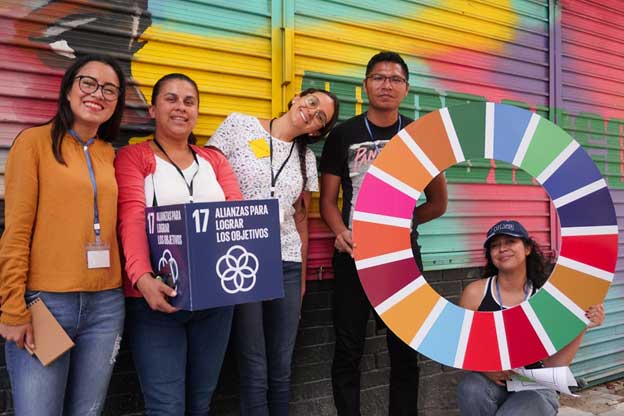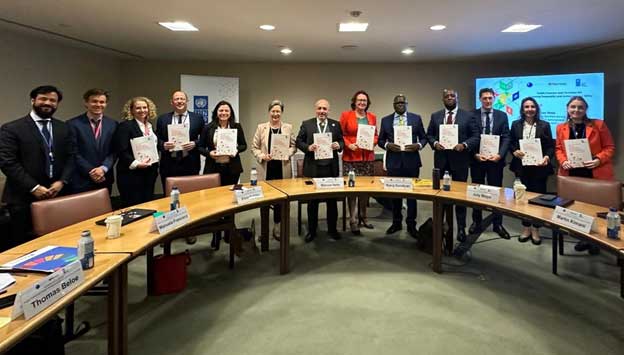How do Taxes Drive the Sustainable Development Goals?

UNITED NATIONS, May 07 (IPS) - Tax revenue remains the most sustainable source of income for governments and plays a crucial role in financing the Sustainable Development Goals (SDGs). It diminishes the need for international assistance and contributes to the repayment of burdensome debt, ultimately strengthening a country’s ability to withstand external shocks.
In 2022, UNDP, in partnership with the Governments of Finland and Norway, launched the Tax for SDGs Initiative with the aim to help countries enhance domestic resource mobilization and advance their progress towards the SDGs.
Under the Initiative, taxation is considered both a tool for revenue collection and a policy instrument to encourage sustainable growth strategies and influence behaviour towards desired outcomes related to climate, nature, well-being and governance.
In 2023, Tax for SDGs made significant headway, signing a total of 22 Country Engagement Plans (CEPs). Through the CEPs, the Tax for SDGs supports governments in addressing tax avoidance, tax evasion and other illicit financial flows, particularly through technical assistance and cooperation facilitation.
It also supports them in aligning their tax and fiscal policies with the SDGs and incorporates perspectives from developing countries into regional and international discussions about taxation.
Additionally, Tax for SDGs has launched the draft SDG Taxation Framework (STF) (Diagnostics), a tool designed to help national governments assess and align their tax systems with the SDGs effectively.
The draft STF (Diagnostics) was piloted in nine focus countries (Armenia, Bhutan, Djibouti, Nigeria, Sri Lanka, Tanzania, Togo, Uzbekistan and Zimbabwe) for selected SDGs based on countries’ priorities. Over 1,500 personnel from 74 government entities have been trained and reported capacity enhancement.
In the words of Achim Steiner, UNDP Administrator: “The success of the Tax for SDGs Initiative is a testament to the collaborative efforts among nations, international organizations, academia and civil society. Together, we have exchanged best practices, knowledge and lessons learned, creating a community dedicated to enacting real change.”

The Tax for SDGs Initiative includes the joint OECD/UNDP Tax Inspectors Without Borders (TIWB) initiative, which operates 59 ongoing programmes across Africa, Asia and the Pacific, the Arab States, Europe and Central Asia, and Latin America and the Caribbean.
It is a unique approach to capacity building that deploys experts to developing country tax administrations to provide practical, hands-on assistance on current audit cases and related international tax issues.
With support from international partners and countries, including France, India and Italy, TIWB has secured in 2023, US$230 million in additional tax revenue collected by developing countries and $1.11 billion in additional tax revenue assessed, totalling $2.30 billion collected and $6.05 billion assessed overall since its launch in 2015.
To facilitate the inclusion of developing countries in global tax discussions, the Tax for SDGs Initiative held several events. These included a session with the World Health Organization during the UN General Assembly in September and the second 2023 Dialogue on Tax and SDGs, which convened 400 policymakers from 61 countries, including 14 ministers, alongside tax officials, diplomats and thought leaders from 48 organizations.
These discussions enhanced understanding of the connections between taxation and the SDGs, fostered peer-to-peer exchange, developed interdisciplinary tax approaches, and explored innovative tax measures for sustainable development.
Moreover, the Initiative organized missions, workshops and a national dialogue with parliamentarians, youth, researchers and taxpayers to assist tax authorities in capacity building and implementing SDG-aligned policies.
Marcos Neto, in his opening speech at the 2024 ECOSOC Financing for Development Forum side event on Tax for SDGs, emphasized the work of the Initiative: "By building on the success of the Tax for SDGs Initiative, we aim to provide countries with the tools and expertise needed to align their tax and budget policies with sustainable development objectives."
"The success of the Tax for SDGs Initiative is a testament to the collaborative efforts among nations, international organizations, academia and civil society," said Achim Steiner, UNDP Administrator.
Tax for SDGs achieved significant progress across regions. In Africa, it launched Country Engagement Plans and Tax Inspectors Without Borders programmes, emphasizing digitalization and policy integration such as Tax and Gender Initiatives.
In Europe and the Commonwealth of Independent States, Tax for SDGs facilitated the implementation of key legislative reforms in Armenia and Uzbekistan. The Arab States, with the support of the Initiative, improved digital tax administration and climate-related tax policies, notably in Lebanon and Egypt.
Tax for SDGs also initiated programmes in Peru and Saint Lucia and contributed to digitization reforms in Honduras. In the Asia-Pacific region, fiscal policies were strengthened, and taxpayer trust was built through strategic partnerships.
This impactful work highlights the keen interest of governments in collaborating with UNDP to create policies that finance sustainable growth and advance the implementation of the SDGs.
UNDP remains committed to collaborating with partners and donors to advance initiatives such as Tax for SDGs. As Bjørg Sandkjær, State Secretary at the Ministry of Foreign Affairs of Norway, mentioned at the Finance for Development Forum: "We greatly appreciate the partnership with UNDP and other partners within the Tax for SDGs Initiative. I believe that the report showcases some impressive achievements, and hopefully, this Initiative will expand to other territories, with new partners joining us."
UNDP Tax for SDGs will continue working with governments to strengthen domestic resource mobilization for financing the SDGs, while also enhancing the capacity of tax administrations to tackle tax avoidance, tax evasion and other illicit financial flows.
Contact Tax for SDGs at taxforsdgs@undp.org, and follow the UNDP Sustainable Finance Hub on X.
Thomas Beloe is Acting Director, Sustainable Finance Hub, UNDP; Ahtesham Khan is Head of UNDP Tax for SDGs
Source: UNDP
IPS UN Bureau
© Inter Press Service (2024) — All Rights ReservedOriginal source: Inter Press Service
Where next?
Browse related news topics:
Read the latest news stories:
- Taliban's Decrees Worsen Crisis for Afghan Women, Banning All NGO Work Tuesday, January 21, 2025
- The First Phase of Israel-Palestine Ceasefire Begins Tuesday, January 21, 2025
- Rethinking Africa’s Debt: Debunking Myths and Identifying Sustainable Solutions Tuesday, January 21, 2025
- A World Where Rich Get Richer, Poor Get Poorer - and Billionaires Rise Tuesday, January 21, 2025
- Food Systems Worsen Diets, Health Tuesday, January 21, 2025
- What is the World Health Organization and why does it matter? Tuesday, January 21, 2025
- World News in Brief: Hostilities in northeast Syria, response plan in Mali, Uyghur deportations in Thailand Tuesday, January 21, 2025
- Ceasefire in Gaza brings hope, but West Bank faces escalating violence Tuesday, January 21, 2025
- Security Council debates growing terrorism threat in Africa Tuesday, January 21, 2025
- Climate emergency: 2025 declared international year of glaciers Tuesday, January 21, 2025